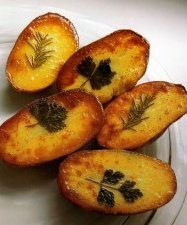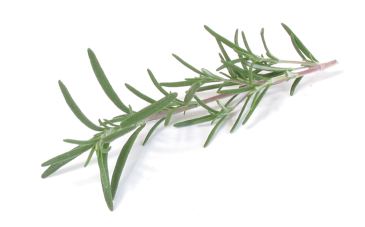As part of an ongoing series, we’ll explore the great big world of herbs in general.
As you know, marijuana has numerous medicinal properties. And many of you are probably already hip to the other herbs out there that possess their own special healing and protective properties.
What you may not know is that herbs possess a more concentrated amount of antioxidants than you’ll get from fruits and vegetables alone. Not only that, but herbs often possess a wider array of antioxidants. So by integrating herbs into your diet, you are protecting your body from free radical damage in a substantial way.
So if marijuana is part of a holistic lifestyle choice, then that lifestyle should include any ways we can return to nature as a method to heal and protect ourselves.
Last month, we explored the myriad of benefits of thyme.
This week, the spotlight is on rosemary.
Rosemary (Rosmarinus officinalis) is a woody, perennial herb with fragrant, evergreen, needle-like leaves. It is native to the Mediterranean region and a member of the mint family Lamiaceae. The name is derived from the Latin name rosmarinus, meaning “dew of the sea,” based on the fact that in many locations it needs no other water than the humidity carried by the sea to live.
Health Properties:
- A study published in the August 23, 2010, issue of Phytotherapy Research confirmed that rosemary does increase circulation by dilating arteries and noted that rosemary has antioxidant properties that reduced atherosclerosis risk in young healthy adults by improving serum activity.
- According to the University of Maryland Medical Center, rosemary has been shown to have antioxidant properties that can prevent free radicals from damaging cell membranes and altering DNA, which can result in cell death.
- Rosemary has been shown to increase the blood flow to the head and brain, improving concentration.
- Rosemary contains anti-inflammatory compounds that may make it useful for reducing the severity of asthma attacks.
- This herb is exceptionally rich in many B-complex group of vitamin, such as folic acid, pantothenic acid, pyridoxine, riboflavin.
- The herb extractions of rosemary when applied over scalp have stimulating function on the hair-bulbs and help preventing premature baldness. It forms an effectual remedy for the prevention of scurf and dandruff. [I have no clue what scurf is but the name conjures up enough.]
- Rosemary tea is a good remedy for removing nervous headache, colds and depression. [I’m drinking this stuff now and high as a kite. It’s potent.]
- Recent research is now revealing even more benefits attached to this rosemary, including its ability to help prevent cancer and age-related skin damage, boost the functioning of the liver and act as a mild diuretic to help reduce swelling.
- Many people gargle rosemary tea to help heal mouth ulcers, sores and as a mouth wash.
Cooking with Rosemary:
Whenever possible, choose fresh rosemary over the dried form of the herb since it is far superior in flavor.
Fresh rosemary herb should be stored in the refrigerator inside plastic bags. Dried rosemary should be kept in an air tight container and placed in a cool, dark and dry place where it will keep fresh for several months.
Finely chopped fresh rosemary is used in the preparation of delicious sauteed rosemary potatoes.
Rosemary complements fatty, strong-tasting meats such as lamb, pork, duck, and game. Add to casseroles, tomato sauces, baked fish, apples, summer wine cups, cordials, vinegars and oils.
Rosemary matches well with garlic and red wine. The spicy, pungent tough leaves of late season rosemary are strongly aromatic and peppery and will add to the roasting or grilling of meat. Use rosemary sprigs to flavor grilling charcoals or use sprigs to brush olive oil on meat and poultry before roasting.
Rosemary flowers are sweetly perfumed and delicious on salads, rice, pasta, or fruit salads.
Use the branch of rosemary to skewer meat and poultry before grilling. It infuses the food with the taste.
When burned, rosemary branches give off a distinct mustard smell, as well as a smell similar to that of burning wood, which can be used to flavor foods while barbecuing.
Random Facts and Tips about Rosemary:
- In ancient Greece, the smell of rosemary was thought to enhance one’s memory. Students used to wear a sprig of rosemary behind their ear when studying and then later when taking their exams.
- In Ancient Greece, people burned rosemary branches on the altars of the gods, considering it a sacred herb. The plant was also sacred for the Romans (who gave it its name) and Egyptians (the evidence to that was finding traces of rosemary in the pharaohs’ tombs.)
- The custom of burning rosemary branches has become a practice in hospitals in France – where it has been maintained until the 20th century – and used for cleaning the air.
- The goddess Aphrodite is associated with rosemary, as is the Virgin Mary, who was supposed to have spread her cloak over a white-blossomed rosemary bush when she was resting; according to legend, the flowers turned blue, the color most associated with Mary.
- It was said to be draped around Aphrodite when she rose from the sea, and was originally born of Ouranos’s semen. [Oh, mythology, you’re so weird.]
- Rosemary tea is a popular flavor drink in Mediterranean region.
- Rosemary can be used in place of rice at weddings. It’s the herb of remembrance (good for remembering vows) and smells lovely when people walk on it.
- Throw some rosemary in the fireplace on the outer edges of the burning wood and your space comes alive with a delightful, pine-scented aroma.
Recipes:
Tattooed Potatoes with Rosemary
1/3 to 1/2 cup extra-virgin olive oil
1 teaspoon salt
1/2 teaspoon freshly cracked pepper
6 small fresh rosemary sprigs
3 russet potatoes, unpeeled, cut in half lengthwise
Preheat oven to 400 degrees F.
Pour the olive oil into a medium-sized glass baking dish and add the salt and pepper. Stir to combine. Press a rosemary sprig or parsley leaf on the cut side of each potato half and place cut side down in the oil.
Note: A glass dish works well in this case because you can check for doneness by carefully holding the dish overhead and looking to see if the potatoes are browned. When you do this, be careful not to spill the hot oil. A metal pan will do, too, but testing for doneness will not be as easy.
Bake until the potatoes are nicely browned, 40 to 45 minutes. While the potatoes are cooking, using a spatula, gently move them every now and then to keep them from sticking. When they are ready, remove them from the pan, turning them flat side up and carefully leaving the pressed herb in place. Arrange on a platter and serve immediately.
Makes 4 to 6 servings.
Interactions:
If you have epilepsy, don’t take medicinal amounts of rosemary. The camphor in the herb could potentially aggravate seizures.
Pregnant women and those with high blood pressure should not take Rosemary extract. (However, the amounts that typically appear in food or cosmetics pose no risk.)
Antiplatelet and anticoagulant drugs (blood-thinners) — Rosemary may affect the blood’s ability to clot. It could interfere with any blood-thinning drugs you are taking, including:
- Warfarin (Coumadin)
- Clopidogrel (Plavix)
- Aspirin
ACE inhibitors — Rosemary may interfere with the action of ACE inhibitors taken for high blood pressure.
- Captpril (Capoten)
- Elaropril (Vasotec)
- Lisinopril (Zestril)
- Fosinopril (Monopril)
Diuretics (water pills) — Because rosemary can act as a diuretic, it can increase the effects of these drugs. That can raise your risk of dehydration.
- Furosemide (Lasix)
- Hydrocholorothiazide
Lithium — Because of its diuretic effects, rosemary might cause the body to lose too much water and the amount of lithium in the body to build up to toxic levels.
Diabetes — Rosemary may alter blood sugar levels and could interfere with any drugs taken to control diabetes.
Sources:
Beth Mann is a popular blogger and writer for Open Salon and Salon. She is also an accomplished actor and director with over 15 years of experience, as well as the president of Hot Buttered Media. She currently resides at the Jersey shore where she can often be seen surfing or singing karaoke at a local dive bar.
Contact: maryjane {at } freedomisgreen.com

